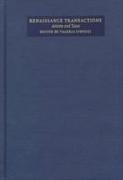Read more
"Most of the leading and well-known scholars of the Italian Renaissance are represented here with their sundry and complementary viewpoints. . . . The presence of so many different critical voices conveys a sense of this volume as a "summa" of current Renaissance criticism."--Giuseppe Mazzotta, Yale University
List of contents
Acknowledgments
Introduction: Ariosto, Tasso, and Storytelling / Valeria Finucci
I. Crossing Genres
Two Odysseys: Rinaldo's Po Journey and the Poet's Homecoming in
Orlando furioso / Ronald L. Martinez
The Grafting of Virgilian Epic in
Orlando furioso / Daniel Javitch
Tasso's Armida and the Victory of Romance / Jo Ann Cavallo
II. The Politics of Dissimulation
Epic in the Age of Dissimulation: Tasso's
Gerusalemme liberata / Sergio Zatti
Trickster,
Textor, Architect, Thief: Craft and Comedy in
Gerusalemme liberata / Walter Stephens
"Un cosi valoroso cavalliero": Knightly Honor and Artistic Representation in
Orlando furioso, Canto 26 / Katherine Hoffman
III. Acting Out Fantasies
The Masquerade of Masculinity: Astolfo and Jocondo in
Orlando furioso, Canto 28 / Valeria Finucci
Romance as Role Model: Early Female Performances of
Orlando furioso and
Gerusalemme liberata / Eric Nicholson
"
Dal rogo alle nozze": Tasso's Sofronia as Martyr Manque / Naomi Yavneh
Writing beyond the
Querelle: Gender and History in
Orlando furioso / Constance Jordan
Index
Contributors
About the author
Valeria Finucci is Associate Professor of Italian at Duke University. She is the author of The Lady Vanishes: Subjectivity and Representation in Castiglione and Ariosto and the coeditor of Desire in the Renaissance: Psychoanalysis and Literature.
Summary
The controversy generated in Italy by the writings of Ludovico Ariosto and Torquato Tasso during the sixteenth century was a historically important debate on what constitutes modern literature. This book re-examines these two poet-thinkers, the debate they inspired, and the reasons why that debate remains relevant.

